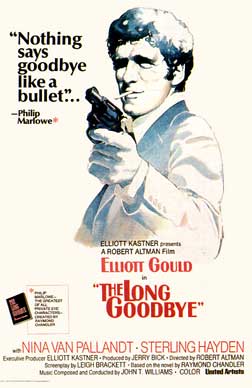Raymond Chandler For The 1970s
- Author Raymond Chandler's Philip Marlowe character has been seen in many classic films, but he is reinvented for the 1970s through Elliot Gould in Robert Altman's film The Long Goodbye.
Minding his own business as usual, Marlowe finds himself in a tough spot very fast as forces of nature bring him smack-dab in the middle of a situation involving the murder of his good friend's wife.
If you are coming to this film looking for a Bogart-like tough guy Philip Marlowe film, you should turn around and look someplace else. Eminent writer Leigh Brackett (having written, oddly enough, a past Bogart-starring Marlowe film in The Big Sleep (1946)) pens another very intelligent yet funny Chandler adaptation and, combining with director Robert Altman's stubborn visual and storytelling ingenuity, The Long Goodbye is a very smart, dark, and character centered crime drama with Marlowe trying to make sense of the involved case as his morals and pursuit for vengeance battle it out in his head.
Prior to The Long Goodbye in 1973, Philip Marlowe had always been presented on screen as a middle-aged man. In The Long Goodbye however, while old enough to have some experience at the private eye gig, Marlowe is still clinging on to some youth. Unlike some of the other Marlowe films, Philip Marlowe is not portrayed as a typical private detective here in The Long Goodbye; through Brackett's fine script and Elliot Gould's outstanding performance, Philip Marlowe is a smart, sarcastic, cynical, and all-too human maverick of a private investigator. This well-defined stand out Marlowe is a very satisfying 1970s interpretation of Chandler's original character.
The cast outside of Gould fit their roles perfectly as well. Sterling Hayden gives an especially scene-stealing and eye-opening performance as the off-his-rocker and drunk-as-a-skunk Roger Wade. Seriously, where was the Academy in 1973? Hayden's supporting performance in this film is certainly an Oscar-worthy one. Nina Van Pallandt also shines in her role as Roger Wade's mysterious wife Eileen and Mark Rydell grabs some attention as the ruthless crime boss Marty Augustine – oh, and keep an eye out for a young Arnold Schwarzenegger in one of this first films.
A lot of Chandler purists, arguably rightly so, take umbrage with how The Long Goodbye takes liberties with Chandler's original novel. I personally understand this side but, as a huge Chandler fan myself, I think that there is a place for a "liberty-taking" Chandler adaptation in the diverse unofficial and disconnected Marlowe film series. I would love to see more Marlowe films around, even if it means adding or subtracting from Chandler and making Marlowe change with the times a bit (but not too much, mind you!). And even though Altman arguably does not serve Chandler's original novel well, I do feel like Gould certainly did Chandler's Philip Marlowe character right and I love the idea of a "Rip Van Marlowe," waking up with his 1940s ideals in a very different 1970s world, that the film conveys.
Overall, I would say that The Long Goodbye is not the best Marlowe film (my favorite is Edward Dmytryk's definitive Chandler screen adaptation Murder, My Sweet (1944) - with Howard Hawks' The Big Sleep (1946) next in line) but it is a general favorite of mine that I revisit often. The Long Goodbye is one of those films that gets every kind of reaction out of you in a very positive way - laughing, thrilled, shocked, impressed, and definitely entertained all around. Because of the film's smart script, fantastic look, and unique take on Philip Marlowe, The Long Goodbye is a fabulous film and easily one of the best films that spotlight the Philip Marlowe character.
CBC Rating: 9/10

No comments:
Post a Comment